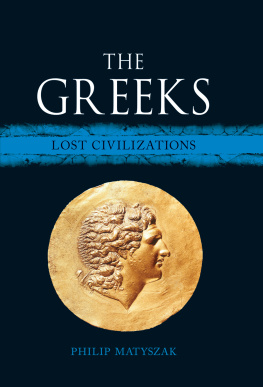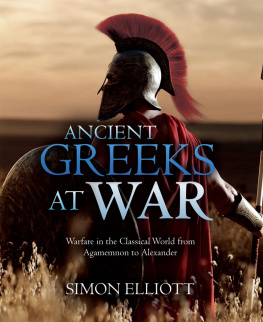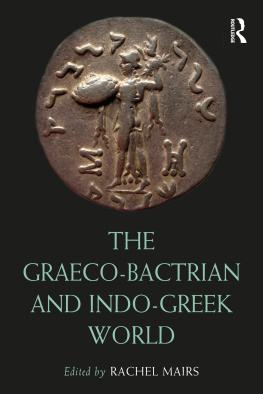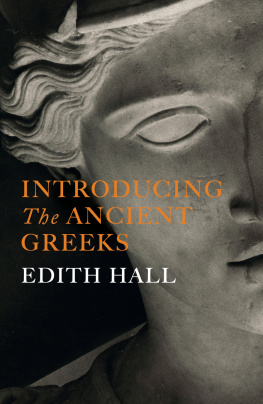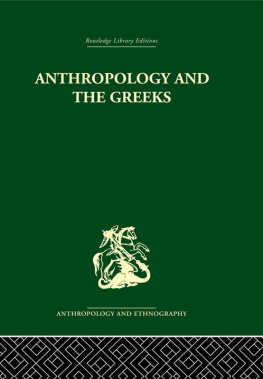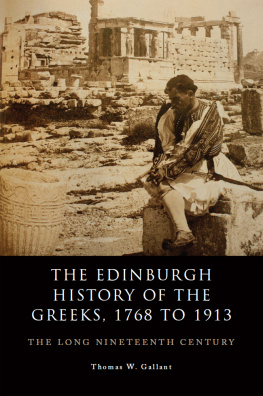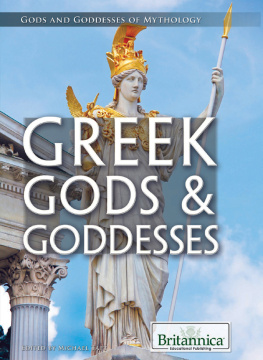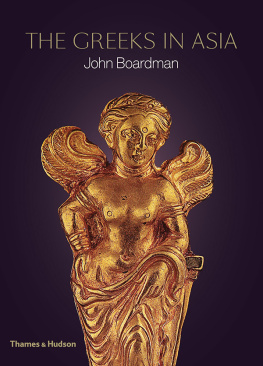Contents
Guide
Page List
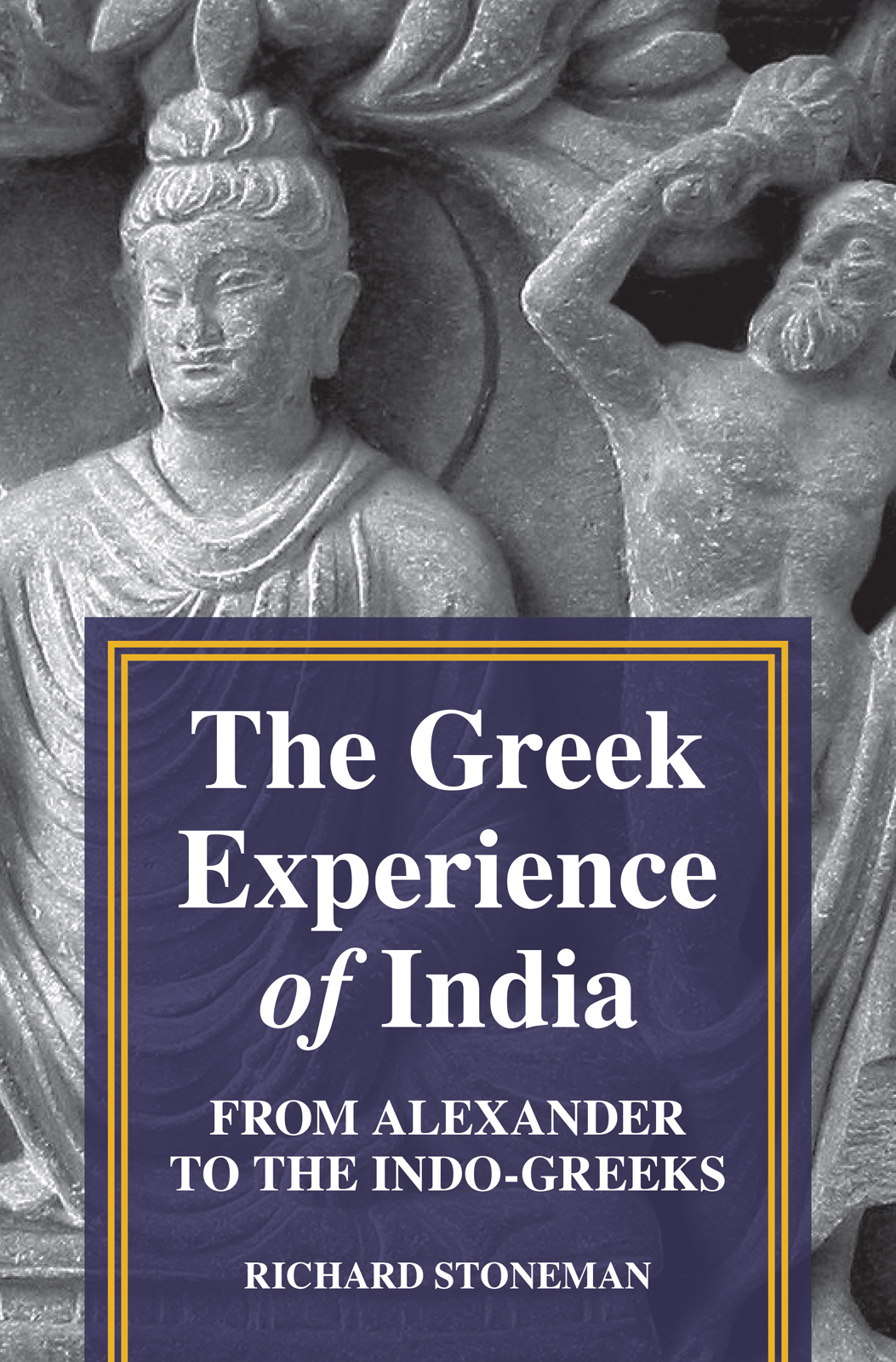
THE GREEK EXPERIENCE OF INDIA
The Greek Experience
of India
FROM ALEXANDER TO THE INDO-GREEKS
RICHARD STONEMAN
PRINCETON UNIVERSITY PRESS
PRINCETON & Oxford
Copyright 2019 by Princeton University Press
Published by Princeton University Press
41 William Street, Princeton, New Jersey 08540
6 Oxford Street, Woodstock, Oxfordshire OX20 1TR
press.princeton.edu
Jacket image: The Buddha accompanied by Vajrapani, who has the characteristics of the Greek Heracles
The epigraph, An Ordinary Person, is from I Wont Let You Go: Selected Poems by Rabindranath Tagore, 2nd expanded ed., translated by Ketaki Kushari Dyson.
Copyright 1991, 2010. Reprinted by permission of Bloodaxe Books, Ltd.
All Rights Reserved
LCCN 2018958249
ISBN 978-0-691-15403-9
eISBN 978-0-691-18538-5 (ebook)
Version 1.0
British Library Cataloging-in-Publication Data is available
Editorial: Ben Tate and Hannah Paul
Production Editorial: Kathleen Cioffi
Jacket Design: Layla MacRory
Jacket Credit: Gandhara relief
Production: Jacqueline Poirier
Publicity: Jodi Price
To Aleksandra Szalc
An Ordinary Person
A stick under his arm, a pack on his head,
At dusk a villager goes home along the river.
If after a hundred centuries somehow
By some magic from the pasts kingdom of death
This peasant could be resurrected, again made flesh,
With this stick under his arm and surprise in his eyes,
Then would crowds besiege him on all sides,
Everyone snatching every word from his lips.
His joys and sorrows, attachments and loves,
His neighbours, his own household,
His fields, cattle, methods of farming: all
They would take in greedily and still it wouldnt be enough.
His life story, today so ordinary,
Will, in those days, seem charged with poetry.
RABINDRANATH TAGORE
CONTENTS
xi
xv
xvii
ILLUSTRATIONS
PREFACE AND ACKNOWLEDGEMENTS
THIS BOOK HAS BEEN a long journey, since I first began to reflect on Alexanders encounter with the naked philosophers of Taxila in the early 1990s. Many other projects intervened before I felt ready to embark on the research for this book. It has benefited from a number of external stimuli. Al Bertrand agreed to publish the book, and both he and his successor in Princetons Oxford office, Ben Tate, have shown admirable patience as I worked to complete it.
I must mention in particular my friend and colleague Richard Seaford, who shares my interest in the relations of Greece and India (though he stops where I start, in the fourth century BCE): we have had many conversations over the last few years about matters covered in this book, and I am grateful to him for reading parts of it as well. John Wilkins also gave valuable comments on portions of the book. A long conversation with Robin Lane Fox was also rewarding. I have also benefited from the expertise of Aleksandra Szalc, whose PhD from Wrocaw is on the subject of Indian elements in the Alexander Romance. Sushma Jansari (British Museum) was kind enough to let me read her PhD thesis on Megasthenes. A lecture by Sushmita Basu Majumdar about the jvikas, given at the conference organised by Richard Seaford in 2014, was a source of illumination, while her photographs galvanised me into organising a first trip to India in 2015.
Trailfinders provided a bespoke travel service and organised a smoothly run itinerary around a somewhat unusual list of places in India. They organised a second such trip in 2016. On both occasions we had excellent drivers and guides, and I must single out the guides to Patna and Sanchi for their knowledge and diligence, and the enthusiasm with which they responded as it became evident that I was determined to see everything. The guide at Ajanta (Amud) was equally thorough, and introduced me for the first time to the Citra Stra (see ).
Chance encounters also forward scholarship. At Mumbai airport I fell into conversation with Diane Tepfer, a student of Walter Spink, who set me on the way to his scholarly work on Ajanta. Three academic readers for Princeton University Press have expanded my horizons, bibliographical and otherwise, and helped me to clarify many of my ideas.
The University of Exeter continues to provide a background for my scholarly work, and I have benefited from access to its library, as well as those of the Institute of Classical Studies, the School of Oriental and African Studies, the Bodleian and Sackler Libraries and Oriental Institute in Oxford, and the London Library.
ABBREVIATIONS AND CONVENTIONS
| CHI | The Cambridge History of India |
| CIG | Corpus Inscriptionum Graecarum |
| DI | Didyma Inscriptions |
| FGRH | F. Jacoby, Die Fragmente der griechischen Historiker |
| OGIS | Orientis Graecae Inscriptiones Selectae |
| POXY | Oxyrhynchus papyri |
| PSI | Papiri greci e latini (Societ italiana per la ricerca dei papiri greci e latini in Egitto) |
| RE | Paulys Realencyclopdie der Alterumwissenschaft |
| SEG | Supplementum Epigraphicum Graecum |
Greek and Latin authors and their works are cited according to standard abbreviations, as specified in for example the Oxford Classical Dictionary and Liddell and Scotts GreekEnglish Lexicon. Classical journals are cited according to the conventions of LAnne philologique. The titles of Indology journals are normally cited in full.
The Mahbhrata is cited in the Chicago translation by van Buitenen and Fitzgerald where available (books 15, and 1112, part I) and for the rest from the translation by Kisari Mohan Ganguli. The g Veda is cited from the Oxford translation by Jamison and Brereton.
Greek names are normally Latinised. Greek is frequently quoted in Greek, but individual words and short phrases are generally transliterated.
Sanskrit and other Indian languages are transliterated according to the standard system. (See, for example, Teach Yourself Complete Sanskrit.) Thus:
Long and short vowels are distinguished.
Consonants are sounded roughly as in English except that:
c represents the sound ch as in church;
letters dotted below ( ) are retroflex;
represents a nasalisation of the preceding vowel;
is palatal; is velar;
r and are semivowels;
(palatal) resembles English sh
bh ch dh h gh jh kh ph th h are aspirated consonants: thus ch, th and ph are not pronounced as in English church, thing or phantom, but separately as in clubhouse, church hall, madhouse, dog-house, barge-house, Okehampton, flophouse, hothouse. (The retroflex consonants have no equivalent in English.)
THE GREEK EXPERIENCE OF INDIA
PROLOGUE
The Moon at Noon
IN INDIA , the curving moon lies on its back, and resembles a little boat sailing sedately across the heavens. The Greek hero Heracles sailed across the sky to the west in the boat of the Sun, a beneficent god. In India, the sun, Surya, is also a god, and the dawn, Uas, is a goddess, but the moon is not, like the Greek eye of night, a goddess.


